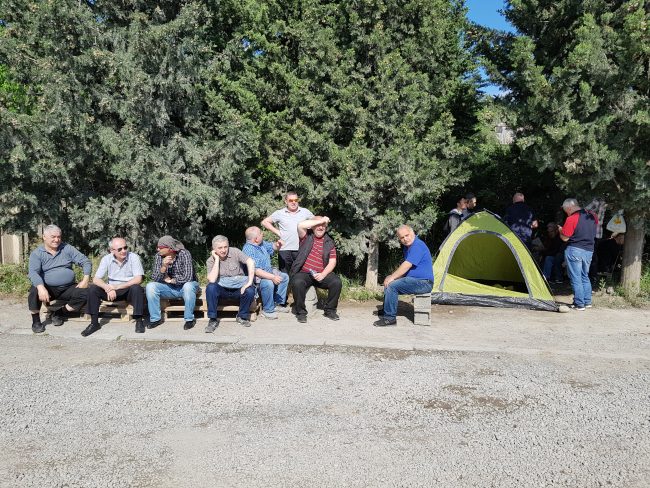
 The Tbilisi Metro is likely to shut down on Monday, as metro drivers have gone on hunger strike. On Sunday, dozens of drivers gathered to announce they are using their ‘non-working hours’ to go on hunger strike after a Georgian court ruled they could only go on strike during their off-hours.
The Tbilisi Metro is likely to shut down on Monday, as metro drivers have gone on hunger strike. On Sunday, dozens of drivers gathered to announce they are using their ‘non-working hours’ to go on hunger strike after a Georgian court ruled they could only go on strike during their off-hours.
In its ruling on 21 March, Tbilisi City Court indefinitely forebode metro drivers’ union Ertoba 2013 from going on strike ‘during working hours’. The drivers said the Tbilisi Transport Company, who operate the metro, have internal regulations obliging them to be well-rested before work, which might be compromised on Monday as they will be sleepless because of their hunger strike.
Archil Labadze from Ertoba 2013 told OC Media the metro drivers will go to work tomorrow and declare they are tired and sleepless, and therefore cannot take responsibility for driving trains.
‘This automatically means the Metro will stop as there won’t be anyone left who could substitute the drivers. Everyone who is currently off work is here with us’, said Labadze.
The metro drivers said their protest would last until their demands are met.
On 18 April, Tbilisi metro drivers demanded a salary raise due to ‘harsh working conditions’. They warned that they would go on strike on 3 May, paralysing the whole metro system. The drivers said an average driver made ₾1,150 ($465) a month before tax, an hourly wage of ₾7 ($3), which they said should be raised to ₾10 ($4) per hour.
On 2 May, Tbilisi City Court ruled they could not go on strike for a month. The later ruling changed this to an indefinite ban on striking.
Lela Gvishiani, a lawyer from Tbilisi-based rights group the Human Rights Education and Monitoring Centre (EMC), told OC Media the strike does not violate the labour code or the court’s ruling.
‘Their internal regulations say they have to be rested and in good health when working. They suppose their health will be compromised during the [hunger] strike’, said Gvishiani.
Tbilisi Mayor Kakha Kaladze said that if the drivers do not work, they may not be paid.
‘We will not allow blackmailing. Right now we cannot afford a 45% salary raise for people who are paid from ₾1,400 to ₾1,800’, said Kaladze.
‘The Mayor’s Office has not violated the law. The court temporarily suspended their right to strike and the court discussions proceed. Before there is a decision, metro drivers have no right to go on strike’, Kaladze said on Sunday.
In a statement, the Tbilisi Transport Company called on metro drivers to abstain from ‘unlawful activities’ as the ‘court’s ruling banning striking served the purpose of ensuring people wouldn’t be hindered from doing their job’.
[Read more about the court’s judgement on OC Media: Tbilisi court indefinitely bans metro strike ‘during working hours’]
Metro drivers have been demanding higher salaries since 2016. Ertoba 2013 has said that high humidity, noise, vibrations, light intensities, strong electric fields, high pressure, and other hazards to health contribute to a 60%–65% mortality rate by pension age among drivers.




 3 June 2018
3 June 2018


